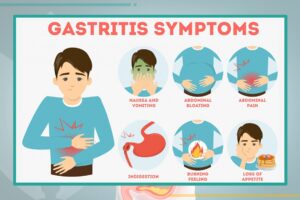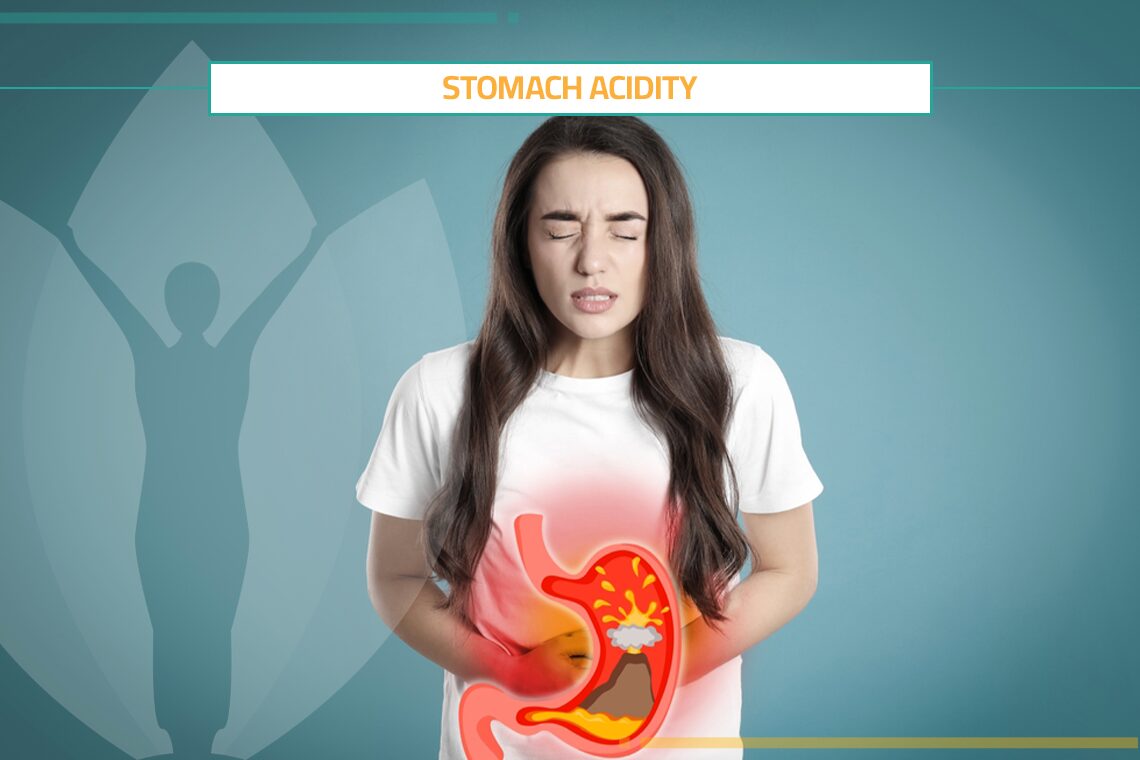What`s Stomach Acidity?
When stomach acid escapes and enters your esophagus and throat, it is known as Stomach Acidity. The lower esophageal sphincter (LES), a ring of muscle, acts as a valve at the opening to your stomach. Normally, food passes through the LES and it shuts. But stomach acid can enter your esophagus if it doesn’t seal completely or opens too frequently. This may result in symptoms like heartburn, a burning discomfort in the chest. You may have acid reflux disease, also called gastroesophageal reflux disease (GERD), if you experience symptoms of acid reflux more than twice a week.
Stomach Acidity Reasons
Why might one have elevated stomach acid?
A number of illnesses can cause elevated stomach acid. These illnesses frequently result in an excess of the hormone gastrin. A hormone called gastrin instructs your stomach to secrete more acid.
Among the most typical acid reflux causes are:
Rebound acid hypersecretion: H2 blockers are one class of drugs that lower acid production in the stomach. People who stop using this medicine occasionally experience an increase in stomach acid. Although it is debatable, there is evidence that this can also occur after stopping proton pump inhibitors (PPIs).
The symptoms of Zollinger-Ellison syndrome Tumors: in your small intestine and pancreas called gastrinomas develop when you have this uncommon ailment. High amounts of gastrin are produced by gastrinomas, which raises stomach acid.
Infection caused by Helicobacter pylori: H. pylori is a type of bacteria that can enter the stomach and produce ulcers. High stomach acid can also be a symptom of H. pylori infection in certain individuals.
Gastric outlet obstruction: An obstruction in the passageway that connects the stomach to the small intestine may cause the stomach’s acidity to rise.
Chronic renal failure: Rarely, individuals receiving dialysis or having kidney failure may create excessive amounts of gastrin, which raises the production of stomach acid.
It’s also crucial to remember that there are situations in which a particular reason for elevated stomach acid cannot be found. Idiopathic refers to a medical disease when the reason is unknown.
Stomach Acidity Symptoms
Symptoms of Acid Reflux
Typical signs of acid reflux include:
1. Rregurgitation: a sharp ache or discomfort that could radiate from your stomach to your chest, belly, or even your throat.
2. Recurrence: an acid that tastes sour or bitter that backs up in your mouth or throat.
Additional indications of acid reflux illness consist of:
- Bloating
- Black or bloody stools, or vomit that is bloody
- Burping dysphagia is the feeling that something is lodged in your throat.
- Pauses that don’t stop
- Emesis
- Loss of weight without apparent cause
- Hoarseness, a dry cough, wheezing, or a persistent sore throat
- Poor taste in the mouth or poor breath
- Chest ache
- Inhalation

Everything you need to know about Vitamin C deficiency
Complications of Sever Stomach Acid
Risk Factors
The following are a few possible risk factors for having excessive stomach acid:
1. Medicine: Rebound hyperacidity can occur if you take medicine to reduce stomach acid production and then stop using it. But eventually, this usually gets resolved on its own.
2. Infection with H. pylori: Stomach acid production may rise if you have an active H. pylori bacterial infection.
3. About 25 to 30 percent are genetic: Many gastrinoma patients, or tumors that develop in the pancreas or duodenum, have a hereditary disorder known as multiple endocrine neoplasia type 1 (MEN1).
People who have high stomach acid levels may also suffer from other stomach-related illnesses. People who have H. pylori or ZES infections may develop PUD. ZES may also induce symptoms similar to GERD. There might be some evidence—from a reliable source—that GERD and H. pylori infections are related. Still, more research is required to bolster this.
PUD
Open sores, or ulcers, are a common symptom of PUD because of exposure to stomach acid. Healthcare professionals refer to their ulcers, which are typically in the duodenum or stomach, as duodenal or gastric ulcers, respectively. Many PUD sufferers don’t exhibit any symptoms. Others might be experiencing severe symptoms that require immediate medical intervention.
Long-term or high-dosage users of nonsteroidal anti-inflammatory drugs are more likely to develop PUD. PPIs are used by doctors to treat almost all peptic ulcers.
GERD, or Gastroesophageal Reflux Disease
Gastroesophageal reflux (GER) is not the same as GERD. A person may have GER if their stomach acid periodically refluxes up into their esophagus. Many people occasionally have GER. Heartburn can occasionally be experienced by someone with GER, although most of the time there are no symptoms.
A person has a more severe, chronic, and dangerous form of GER if they have GERD. Recurrent symptoms in GERD patients may cause difficulties. If someone believes they may be having GERD symptoms, they should consult a healthcare provider, who may include:
- A mouthful of food flavor or gastric acid
- Heartburn discomfort or trouble swallowing food nausea
- Chest discomfort
- Prolonged hoarseness or coughing
- In the long run, GERD can lead to major issues for those who do not receive therapy.
Do infants develop GERD?
Babies frequently spit up, or regurgitate. It may contain some acid, but usually not enough to cause them any concern. A more serious illness called GERD might lead to discomfort or difficulties when feeding.
If a baby is born preterm or has an esophageal problem, they are more prone to develop GERD. If something seems off with your baby, a pediatrician may do a GERD screening.
In infants or young children, GERD symptoms might include:
- Very fussy behavior.
- Inability to sleep.
- Refusing to eat.
- Brief spells of vomiting.
- Breathlessness or huskiness.
- Foul breath.
Discover Root Canal Treatments
Foods that Cause Indigestion
According to Gupta, foods that are frequently identified as heartburn triggers relax the esophageal sphincter, delaying the breakdown of food and allowing it to remain in the stomach for longer. The worst offenders? foods heavy in fat, salt, or spices, like:
- Fried dishes
- Quick food
- Pizza
- Chips made from potatoes and other processed foods
- Pepper (white, black, and cayenne) and chili powder
- Fatty meats, like sausage and bacon
- Cheese
Additional foods that may result in the same issue include:
- Sauces made with tomatoes
- Fruits of the citrus
- Espresso Peppermint
- Carbonated drinks
“Moderation is key since many people may not be able to or want to completely eliminate these foods,” Gupta states. To prevent issue foods from building up in your stomach and then passing up your esophagus when you lay down at night, try to avoid eating them in the late evening or right before bed. Additionally, eating smaller, more frequent meals is a better idea than larger, heavier ones. Late-night dinners and bedtime snacks should also be avoided.”
What Connection Exists between Acid Reflux and Anxiety?
Acid reflux is the result of stomach acid seeping back up into the esophagus, or food pipe. Persistent acid reflux is known as gastroesophageal reflux disease (GERD). The body’s natural reaction to stress is anxiety. Ironically, feeling anxious can lead to stress in and of itself, which can start a vicious cycle.
Research indicates that anxiety and stress may either cause acid reflux or exacerbate its symptoms. For example, a 2018 study (Trusted Source) with over 19,000 participants discovered that GERD symptoms were more common in those who experienced anxiety.
The study’s authors propose a number of plausible physiological explanations for this:
* The lower esophageal sphincter, a strip of muscle that seals the stomach and stops acid from escaping into the esophagus, may become less pressurized in response to anxiety.
* Anxiety and stress reactions can result in chronic muscular tension. This could raise the pressure inside the stomach and force the acid upward if it has an impact on the surrounding muscles.
* The production of stomach acid may be increased by high anxiety levels.
* In certain instances, those who experienced the same number of acid reflux episodes as those who did not experience anxiety perceived these events as being more severe.
An earlier study’s authors also discovered that individuals with higher anxiety levels experienced more severe GERD symptoms, such as heartburn and soreness below the breastbone.
Why Does Anxiety Arise in Patients with Acid Reflux?
Additionally, according to scientists, GERD can significantly increase a person’s stress and anxiety levels. Additional elements that may cause acid reflux include:
- Obesity,
- Smoking,
- Being pregnant,
- Having a hiatal hernia
- Additionally, several drugs may exacerbate the symptoms of GERD or even create it. If a person is worried about acid reflux and GERD, they should consult a doctor about any medications they are taking.





